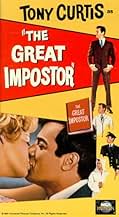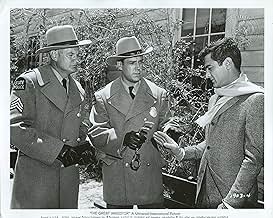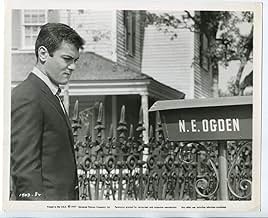VALUTAZIONE IMDb
6,9/10
1780
LA TUA VALUTAZIONE
Aggiungi una trama nella tua linguaFerdinand Waldo Demara Jr. is a versatile man who gets his kicks out of impersonating a marine, a monk, a navy surgeon and a prison warden, eventually getting in trouble with the law for it.Ferdinand Waldo Demara Jr. is a versatile man who gets his kicks out of impersonating a marine, a monk, a navy surgeon and a prison warden, eventually getting in trouble with the law for it.Ferdinand Waldo Demara Jr. is a versatile man who gets his kicks out of impersonating a marine, a monk, a navy surgeon and a prison warden, eventually getting in trouble with the law for it.
- Regia
- Sceneggiatura
- Star
- Premi
- 2 candidature totali
Dick Sargent
- Hotchkiss
- (as Richard Sargent)
Robert Crawford Jr.
- Fred Demara Jr.
- (as Robert Crawford)
Recensioni in evidenza
Tony Curtis may not have been the greatest of actors (though he did give some great performances), but he was very charismatic and immensely likeable and improved hugely with each film, it was very difficult to dislike him even early in his career. Reading the subject matter gave the impression that 'The Great Imposter' would be interesting and entertaining. There is also a good deal of talent in the cast.
Luckily, 'The Great Imposter' turned out to be exactly that, exactly what it seemed it would be on paper. It was interesting and it was very entertaining, the latter being especially strong, those two being its main objectives and they were achieved. Won't say it was a masterpiece or classic cinema because it wasn't, not everything works, but like Curtis one cannot be too hard on 'The Great Imposter' with so much working in its favour. It knows what it wants to be, who to aim it at and shows a lot of effort without trying to bite more than it can chew or play it too safe.
Would have liked DeMura's motivations to have gone into depth more or properly explored/explained, this aspect felt underdeveloped.
Also didn't buy his reform, which felt rushed and too pat to me, but that's personal opinion.
On the other hand, 'The Great Imposter' looks attractive, especially in the photography, and is assuredly directed. The music is never intrusive, low-key, obvious or repetitive, it fits well and not hard at all to remember.
While the facts and subject are adapted loosely and the tone significantly more light-hearted compared to the biography, of which it is a loose adaptation of, the light-hearted wit is infectious, it doesn't get too camp or silly and those unfamiliar with the man and story before seeing the film will find themselves wanting to learn more. The story is crisply paced and while odd in places (in an appealing way) it doesn't get too hard to follow. The surgery scene is priceless and avoids the trap of falling into distaste, do agree though it is not a subject to be laughed or poked fun at usually.
Did worry as to whether Curtis would be able to handle multiple roles and whether he would pull it off, but didn't need to be. He does splendidly here, we have as much fun as he clearly did, and one can really see how much he grew as an actor from when he first started a decade or so before. Raymond Massey, Edmund O'Brien and Karl Malden are particularly note-worthy in support.
All in all, lots of fun. 8/10 Bethany Cox
Luckily, 'The Great Imposter' turned out to be exactly that, exactly what it seemed it would be on paper. It was interesting and it was very entertaining, the latter being especially strong, those two being its main objectives and they were achieved. Won't say it was a masterpiece or classic cinema because it wasn't, not everything works, but like Curtis one cannot be too hard on 'The Great Imposter' with so much working in its favour. It knows what it wants to be, who to aim it at and shows a lot of effort without trying to bite more than it can chew or play it too safe.
Would have liked DeMura's motivations to have gone into depth more or properly explored/explained, this aspect felt underdeveloped.
Also didn't buy his reform, which felt rushed and too pat to me, but that's personal opinion.
On the other hand, 'The Great Imposter' looks attractive, especially in the photography, and is assuredly directed. The music is never intrusive, low-key, obvious or repetitive, it fits well and not hard at all to remember.
While the facts and subject are adapted loosely and the tone significantly more light-hearted compared to the biography, of which it is a loose adaptation of, the light-hearted wit is infectious, it doesn't get too camp or silly and those unfamiliar with the man and story before seeing the film will find themselves wanting to learn more. The story is crisply paced and while odd in places (in an appealing way) it doesn't get too hard to follow. The surgery scene is priceless and avoids the trap of falling into distaste, do agree though it is not a subject to be laughed or poked fun at usually.
Did worry as to whether Curtis would be able to handle multiple roles and whether he would pull it off, but didn't need to be. He does splendidly here, we have as much fun as he clearly did, and one can really see how much he grew as an actor from when he first started a decade or so before. Raymond Massey, Edmund O'Brien and Karl Malden are particularly note-worthy in support.
All in all, lots of fun. 8/10 Bethany Cox
After a detailed reading R. Crichton's, " The Great Imposter," and viewing the movie, it becomes quite obvious that the movie only loosely follows Demara's actual charades and exploits. As a matter of fact, several of scenes in the movie: 1) The manure farmer- police car chase was fictitious, 2) Demara also impersonated Dr. Robert Litton French, as a Professor of Philosophy at Gannon University, 3) As Dr. Cecil Boyce Haman, a candidate for first year law courses at Northwestern University Law School, 4) Demara also enrolled in 10 Catholic monasteries across the county, under assumed identities, using forged documents. He either quit because they were catching on, or he could not endure the physical and spiritual demands of that order, 5) His impersonation in the Royal Canadian Navy was that of Canadian, Harvard-educated Dr. Joseph Cyr, whose complete academic records and personal history he acquired when they were fellow brothers at the "Brothers of Christian Instruction" in Maine. Demara was known then as "Brother John."
The sad irony of Demara's life was that he had the intellect to adapt, learn, survive and prosper in the systems and roles he assumed. He actually did the jobs perhaps equally to, or better than the individuals he impersonated, because he actually believed he had more to prove, to substantiate his value and authenticity. He actually gave more in dedication, effort and work to improve the jobs and positions he impersonated, than he took.
Demara believed he was fighting against an unfair, unjust and discriminatory system, which "starting point" judged a person not by their intellect, personal motivation, character, or ability to do the job,... but solely upon their academic credentials. Demara believed that, if you played by the rules, you either died as a hero, or lived long enough to see yourself become a villain. That the only sensible way to live in this world is without rules. Demara's impersonation of Surgeon Lt. Joe Cyr of the Royal Canadian Navy was the high point, and greatest challenge of his persona. He learned in 4 months reading medical books the equivalent of 5 years of medical school. He could read surgical procedures, memorize, and repeat them to perfection on the operating table.
His greatest disgrace was being uncovered after he completed 19 consecutive life saving surgeries on severely injured Korean War commando team members, when his meritorious actions were broadcast across the entire Canadian and American news media spectrum. Equally devastating was his loss of Lt. Nursing Sister Catherine Lacey, whom he deeply loved and intended to marry after resigning his commission from the RCN, upon his return from Korea.
Demara died at the age of 60, a miserable, lonely and broken man, who never got over loosing Catherine...who had only himself to blame.
The sad irony of Demara's life was that he had the intellect to adapt, learn, survive and prosper in the systems and roles he assumed. He actually did the jobs perhaps equally to, or better than the individuals he impersonated, because he actually believed he had more to prove, to substantiate his value and authenticity. He actually gave more in dedication, effort and work to improve the jobs and positions he impersonated, than he took.
Demara believed he was fighting against an unfair, unjust and discriminatory system, which "starting point" judged a person not by their intellect, personal motivation, character, or ability to do the job,... but solely upon their academic credentials. Demara believed that, if you played by the rules, you either died as a hero, or lived long enough to see yourself become a villain. That the only sensible way to live in this world is without rules. Demara's impersonation of Surgeon Lt. Joe Cyr of the Royal Canadian Navy was the high point, and greatest challenge of his persona. He learned in 4 months reading medical books the equivalent of 5 years of medical school. He could read surgical procedures, memorize, and repeat them to perfection on the operating table.
His greatest disgrace was being uncovered after he completed 19 consecutive life saving surgeries on severely injured Korean War commando team members, when his meritorious actions were broadcast across the entire Canadian and American news media spectrum. Equally devastating was his loss of Lt. Nursing Sister Catherine Lacey, whom he deeply loved and intended to marry after resigning his commission from the RCN, upon his return from Korea.
Demara died at the age of 60, a miserable, lonely and broken man, who never got over loosing Catherine...who had only himself to blame.
I genuinely dislike these smooth-talking narcissistic psychopaths. They're like the guy who pushes in front of you in a long line and offers a charming but false explanation. Great for him but everybody else is deprived of the place in line that they've earned. Very amusing to see DeMara in all these high-status positions -- doctor, researcher from Yale, prison warden, monk. Suppose he'd killed someone on the Canadian destroyer? It doesn't help that he looks heavenward and mutters, "God, please don't let me kill anybody." He should have thought of that before. And his settling down with a straightforward love of his life who reforms him is unbelievable.
That gets the bad stuff out of the way. Tony Curtis is near his best, jaunty when it's called for, sweaty and nervous when necessary. His meeting with Mickey Kellin in the dark prison cell is pretty spooky. We can believe that Curtis is scared. We can also believe that Kellin is anxious to cooperate in some scheme that saves both his neck and his face.
The scene in which Curtis, as a Canadian doctor must remove the abcessed tooth of Captain Edmund O'Brien could not be improved upon. I can't watch that scene without busting up. O'Brien frozen in this awkward position, an agonized expression on his face, like an exhibit in Madam Toussaud's Wax Works.
I'm glad he finally got caught before he caused too much damage. Speaking of the damage we don't see much of it here. It's all pretty lighthearted, which is one way of approaching exploitation. An example of what I mean by "damage." I would feel sorry for the Naval officer who falls in love with him and redeems him, if she existed. In real life, these stimulus-hungry anti-social personalities are easily bored. They tend to attract women, use them, and blow them off. I would expect DeMara to have left a lot of hurt women along his madcap trail.
That gets the bad stuff out of the way. Tony Curtis is near his best, jaunty when it's called for, sweaty and nervous when necessary. His meeting with Mickey Kellin in the dark prison cell is pretty spooky. We can believe that Curtis is scared. We can also believe that Kellin is anxious to cooperate in some scheme that saves both his neck and his face.
The scene in which Curtis, as a Canadian doctor must remove the abcessed tooth of Captain Edmund O'Brien could not be improved upon. I can't watch that scene without busting up. O'Brien frozen in this awkward position, an agonized expression on his face, like an exhibit in Madam Toussaud's Wax Works.
I'm glad he finally got caught before he caused too much damage. Speaking of the damage we don't see much of it here. It's all pretty lighthearted, which is one way of approaching exploitation. An example of what I mean by "damage." I would feel sorry for the Naval officer who falls in love with him and redeems him, if she existed. In real life, these stimulus-hungry anti-social personalities are easily bored. They tend to attract women, use them, and blow them off. I would expect DeMara to have left a lot of hurt women along his madcap trail.
"The Great Impostor" is quintessential Tony Curtis. Curtis was never an exceptional screen actor but a decent one, probably more for his good looks and charisma than his ability to become different people. He is in the category of what I call "charisma actors". (I would include Tom Cruise and Brad Pitt in the same category.) Charisma actors are talented and can be very convincing given the right role. And this was the right role for Curtis.
"The Great Imposter" tells the true story of Ferdinand Waldo Demara (Curtis) who was chronicled in a novelistic book of the same name written by Robert Crighton (who also wrote "The Secret of Santa Vittoria"). Demara assumed different identities, such as a monk, a sheriff's deputy, and notably, a prison warden, usually without the expected credentials. Probably the exploit he is most known for which brought him both recognition but exposed his chicanery was becoming a ship's surgeon for the Canadian military during the civil war in Korea. And he didn't have a medical degree!
Curtis was perfect casting as Demara. He makes his character fun and likeable. The real Demara was somewhat heavy-set, unlike Curtis. However, Curtis captures the essence of Demara's likability which was probably the reason for his success. The real Demara found ways of inserting himself to situations without alienating or threatening those already there. While the movie exaggerates a little bit the outcomes of some of Demara's ventures, it's a fun and thoroughly entertaining film. Not one which will go down in the annals of the greatest movies ever made, but it holds its own. A must for Curtis fans.
"The Great Imposter" tells the true story of Ferdinand Waldo Demara (Curtis) who was chronicled in a novelistic book of the same name written by Robert Crighton (who also wrote "The Secret of Santa Vittoria"). Demara assumed different identities, such as a monk, a sheriff's deputy, and notably, a prison warden, usually without the expected credentials. Probably the exploit he is most known for which brought him both recognition but exposed his chicanery was becoming a ship's surgeon for the Canadian military during the civil war in Korea. And he didn't have a medical degree!
Curtis was perfect casting as Demara. He makes his character fun and likeable. The real Demara was somewhat heavy-set, unlike Curtis. However, Curtis captures the essence of Demara's likability which was probably the reason for his success. The real Demara found ways of inserting himself to situations without alienating or threatening those already there. While the movie exaggerates a little bit the outcomes of some of Demara's ventures, it's a fun and thoroughly entertaining film. Not one which will go down in the annals of the greatest movies ever made, but it holds its own. A must for Curtis fans.
If you haven't seen this movie, catch it for at least one reason: About an hour into it Tony Curtis is passing as a surgeon on a Canadian warboat with Edmond O'Brien as its captain. O'Brien comes down with an impacted molar, and Curtis has to remove it. What happens after that is totally unforgettable. They should make special awards just for scenes this funny!
Lo sapevi?
- QuizTony Curtis as Demara is shown boarding HMCS Cayuga (a Tribal Class destroyer), which was the actual ship the real Demara sailed in.
- BlooperDemara is assigned to HMCS Cayuga on 16 June 1951. However, in the Captain's cabin, there is a picture on the wall of Queen Elizabeth II, who ascended the throne on 6 February 1952 on the death of her father, King George VI. Also, the portrait appears to be the 1956 Pietro Annigoni painting of the queen.
- Citazioni
Ferdinand Waldo Demara Jr.: Help me dear God, I don't want to kill anybody.
- ConnessioniFeatured in The UnXplained: Leading Double Lives (2020)
I più visti
Accedi per valutare e creare un elenco di titoli salvati per ottenere consigli personalizzati
- How long is The Great Impostor?Powered by Alexa
Dettagli
- Tempo di esecuzione1 ora 53 minuti
- Colore
- Proporzioni
- 1.85 : 1
Contribuisci a questa pagina
Suggerisci una modifica o aggiungi i contenuti mancanti

Divario superiore
By what name was Il grande impostore (1960) officially released in India in English?
Rispondi







































